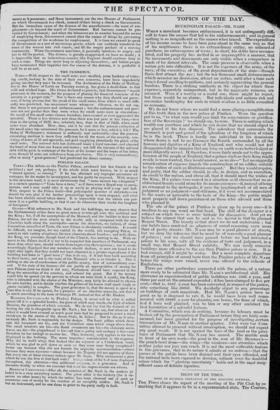PIBILICO PALACE.
TIMES—The debate on the Pimlico Palace, produced but few friends to the architect ; and yet, perhaps, if the whole truth were known, he is as much "sinned against, as sinning." If he has obtained any improper pecuniary ad- vantages, let the matter be investigated, and the guilty be exposed. With respect in the structure itself, it is most unfortunate that " some daemon has whispered" in a certain quarter—" Visto have a taste," as if there were a Royal way to archi- tecture, and a man could take it up as easily as playing with a cup and ball. With respect to the Palace itself—that polyangular monster of deformity—we
should be very glad if the further proceedings upon it were stopped, and what has been already raised taken down. It is impossible that the nation can pre- serve it as a public building, or that it can do otherwise than excite the laughter of foreigners.
GLOBE—With reference to Mr. Nash and his buildings, we may observe that the Parliamentary critics have no great reason to triumph over this architect and the King; for, if all the conceptions of the Monarch and the builder in their new Palace, are not the most chaste in the world, still, as compared with the new Churches built about the metropolis—under the direction, we believe, of some Committee miscalled of Taste, the new Palace is absolutely creditable. It would be difficult, we imagine, for any capital in the world, not excepting Pekin; to match in rich variety of ugliness the new churches about London ; and with them, the King, we presume, though head of the Church, has nothing to do. With re- spect to the Palace itself, it is not to be expected that members of Parliament, any more than other men, should refrain from expressing theiropinions ; but it seems exceedingly ill-judged that any members should declare, as men are found to do night after night, that they would not have objected to a greater expenditure if the building had been in "good taste ;" that is to say, if it had been built according to their tastes, and not to the taste of the Monarch who is to inhabit it. This is adding to the sin of carelessness of the public money, that of extraordinary con- ceit. If the state of the finances did not justify an appropriation of money for new Palaces (and we think it did not), Parliament should have exposed to the King the necessities of the country, and refused the grant. But if the money could fitly be spared (as the persons to whom we refer think it could), the King, who is intrusted with the choice of the Ministers, may fairly be allowed to choose his own builder, and to decide whether the pillars of his house shall stand singly or (more sociably) in couples. The great grievance is, that the money is spent at a time that it can ill be spared, for a purpose of no absolute necessity, not that it is spent according to the taste of George IV. instead of that of Mr. Bankes.
MORNING JOURNAL—As to Pimlico Palace, it never will be what is called grand till it is a splendid bonfire, the glare of which may dazzle, the light of which illumine, the grandeur of which astonish. We do not say that the demerit of se- lecting the site is chargeable upon Mr. Nash ; but this we say, that whoever did select it would have evinced as much good taste had he proposed to erect a royal residence in the centre of the Seven Dials, St. Giles's. But be this as it may, certainly Mr. Nash is responsible for the design. The Ionic pillars which deco- rate the basement are his, and the Corinthian ones which range above them. The small windows are his—the florid ornaments are his—the elaborate archi- traves are his—the gingerbread is his—all that is paltry and cockney is his—and therefore he has enough to answer for. This, however, only applies to the taste displayed in the building. The more important consideration is the expense. Why did he build wings that looked like the adjuncts of a Cheltenham hotel, which he was glad to pull down as soon as they were near being completed? Some say because they did not furnish the requisite accommodation—others because they were eyesores—others because his Majesty did not approve of them. But every one of these excuses reflects upun Mr. Nash. Why recommend a plan which he was the first to find fault with ? Independent of the bad taste displayed throughout, this alteration—this additional expense, is a grievance. And it becomes doubly so when we consider that men the improvements are odious. MORNING CtiaosieLE--After all, the conduct of Mr. Nash in the matters al- luded to is a very secondary matter. The great affair is the trickery (for it de- serves no other name) by which the nation has been choused out of such an enormous sum of money for the erection of an unsightly edifice. Mr. Nash is but an instrument, and no one dares to point to the party really in fault.


















 Previous page
Previous page